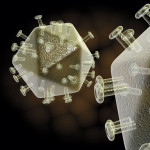A federal grant of nearly $25 million will help researchers study more than 10,000 people living with HIV in Washington, DC, according to a press release from the Milken Institute School of Public Health at George Washington University, which was awarded the five-year grant.
The funding will help researchers continue and expand their efforts to collect data from more than 15 outpatient clinics throughout the district, including academic and community-based clinics, as well as the city’s health department. Titled the DC Cohort, the project launched in 2011.
We are pleased to announce that the #DCCohort was recently awarded a National Institutes of Health (NIH) grant from 2020 through 2025. For more information visit: https://t.co/xIDuaOvw5N pic.twitter.com/TVDvvZaJIF
— DC CFAR (@DC_CFAR) June 8, 2020
The grant arrives from the National Institute of Allergy and Infectious Diseases, which is part of the National Institutes of Health.
“To our knowledge, the DC Cohort is the largest citywide study of people living with HIV in the United States,” said Amanda Castel, MD, MPH, a professor of epidemiology at the Milken Institute who oversees the project, in the press release. “The Cohort offers a unique resource to monitor outcomes among people living with HIV and monitor the impact of initiatives such as Mayor Muriel Bowser’s 90/90/90/50 Plan to End the HIV Epidemic in the District of Columbia.”
According to the project’s website, the DC Cohort aims to “to improve the quality of care and treatment of people living with HIV receiving care at large clinics in the District of Columbia by:
- Linking data from 15 HIV clinic sites to enable evaluation of HIV care provided in the District of Columbia
- Monitoring sociodemographic data, clinical status and treatment regimens of people living with HIV in DC over time
- Providing clinic sites with routine reports on their patient population that enables them to benchmark and improve their standards of clinical care
- Contributing to the research of emerging issues in the prevention, treatment and long-term effects of people living with HIV/AIDS
- Evaluating the impact of HIV screening and prevention programs in collaboration with the DC Department of Health
- Creating a resource to facilitate additional HIV research and assist in identifying patients for research studies.”
Scientists involved with the project hope the emerging data will help them evaluate HIV treatments, better understand the impact of comorbidities such as hepatitis and diabetes and flag emerging issues related to HIV care and treatment. A recent example of their findings can be found in the below tweet:
ICYMI: Read how #DCCCFAR and #DCCohort investigators are analyzing DC Cohort data to learn more about direct oral anticoagulant use and outcomes of INSTI-based ART in youth in these two new publications. Learn more here: https://t.co/rULFZdtjrQ pic.twitter.com/EWroLrcW5M
— DC CFAR (@DC_CFAR) April 24, 2020
You can learn more about the DC Cohort on the George Washington University website.







Comments
Comments